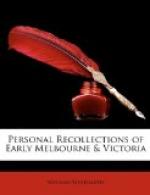Progress of the antipodes.
Already we began in Hobart, and we continued as we went further north, to meet with indications of the progress of the age, quite abreast of, and indeed rather ahead of, all that we have been used to at Home. For instance, we were hardly settled comfortably within Westella, when the waiter announced that. Mr. Fysh, the Tasmanian Premier, wished to see me. I had met Mr. Fysh in London, and I quite expected that he wished to have a talk with me about Tasmanian Finance and Loans. “Is he waiting?” I asked, jumping up at once to go to him. “No, sir,” was the reply, “but he is speaking to you through the telephone.” I passed to the telephone room, and the signal being sent that I was in attendance, I was given two ear-caps and told to listen. A clear, but also “a still, small voice” came up as from the “vasty deep.” Whether from the smallness of it, or from my being unaccustomed to that mysterious sort of thing, I did not catch the words, and had to relinquish the business to our hostess, Miss Westgarth, and thus a meeting was conveniently arranged.
Australian features.
Fortunately for us, we had arrived in a leisure season in the hotel way, so that our host was free to devote himself to us in sightseeing, and thus, with hardly a day and a half to spare, we got a fair idea of Hobart, including a drive along the Huon-road, in whose shaded valleys we found as much snow and ice as though we perambulated the Scotch Highlands in January. This had been, however, an exceptionally severe winter. On the way to Government House, my eyes were once more regaled with the gum trees, in the well-accustomed form of open forest, the ground being covered with grass, on which sheep were depasturing. This is the pleasing characteristic of much of Australian scenery.
The Tasmanian main line.
The next day, Sunday, we had to leave for Launceston, by a special train of the Tasmanian Main Line, so as to be in time for the boat to Melbourne, on which we depended for arrival prior to the opening of the great Exhibition on 1st August. We formed a large and important party, including the Governor and lady, the Premier, Treasurer, and Attorney-General, while the Auditor-General and others were to follow a few days after. We understood there was to be a general concourse from all the surrounding colonies, and so far as regarded the official contribution to the concourse Tasmania had done its duty.
While we ran along this, the chief railway of Tasmania, I recalled something of the endless contentions between its proprietors or agents and the Tasmanian Government. The question requires some study, for the “literature” thereof has already swollen to most inconvenient dimensions. Any way of it, the Government would have done best for the colony if they had themselves built the line. As matters now stand, the company cannot be made to




